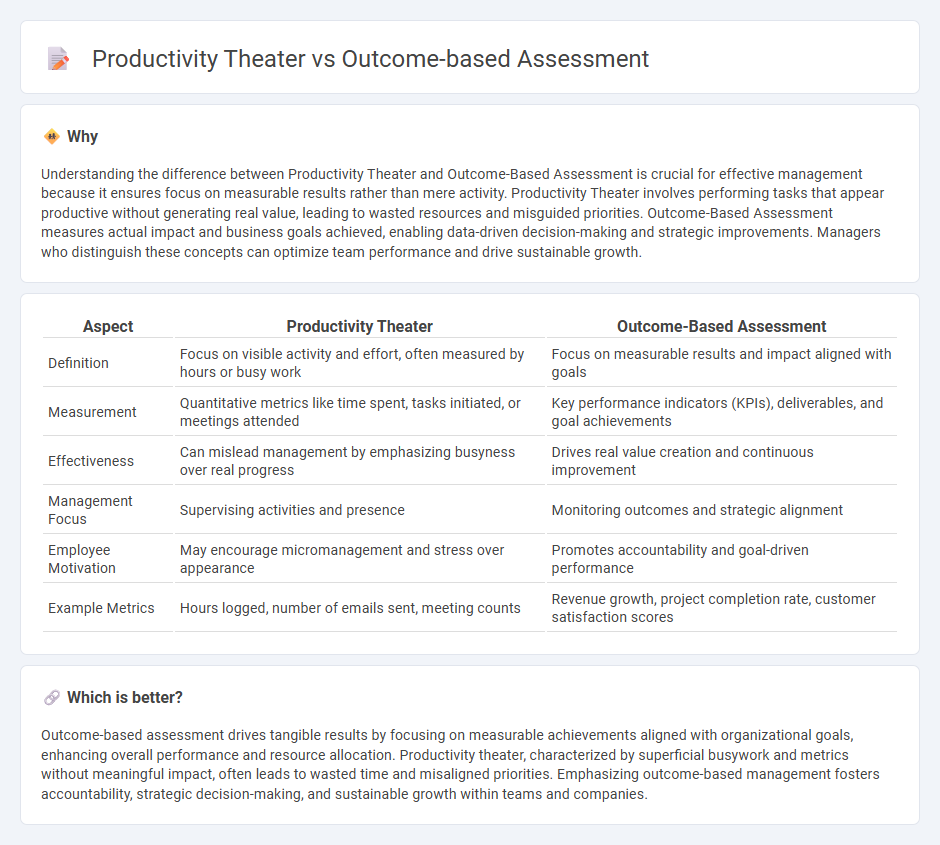
Management strategies often contrast productivity theater--where busy work is mistaken for real progress--with outcome-based assessment that focuses on measurable results and goal achievement. Emphasizing key performance indicators and tangible deliverables drives true business success rather than merely appearing active. Explore effective management techniques to transition from productivity illusions to outcome-driven performance.
Why it is important
Understanding the difference between Productivity Theater and Outcome-Based Assessment is crucial for effective management because it ensures focus on measurable results rather than mere activity. Productivity Theater involves performing tasks that appear productive without generating real value, leading to wasted resources and misguided priorities. Outcome-Based Assessment measures actual impact and business goals achieved, enabling data-driven decision-making and strategic improvements. Managers who distinguish these concepts can optimize team performance and drive sustainable growth.
Comparison Table
| Aspect | Productivity Theater | Outcome-Based Assessment |
|---|---|---|
| Definition | Focus on visible activity and effort, often measured by hours or busy work | Focus on measurable results and impact aligned with goals |
| Measurement | Quantitative metrics like time spent, tasks initiated, or meetings attended | Key performance indicators (KPIs), deliverables, and goal achievements |
| Effectiveness | Can mislead management by emphasizing busyness over real progress | Drives real value creation and continuous improvement |
| Management Focus | Supervising activities and presence | Monitoring outcomes and strategic alignment |
| Employee Motivation | May encourage micromanagement and stress over appearance | Promotes accountability and goal-driven performance |
| Example Metrics | Hours logged, number of emails sent, meeting counts | Revenue growth, project completion rate, customer satisfaction scores |
Which is better?
Outcome-based assessment drives tangible results by focusing on measurable achievements aligned with organizational goals, enhancing overall performance and resource allocation. Productivity theater, characterized by superficial busywork and metrics without meaningful impact, often leads to wasted time and misaligned priorities. Emphasizing outcome-based management fosters accountability, strategic decision-making, and sustainable growth within teams and companies.
Connection
Productivity theater refers to the illusion of work output without meaningful results, often caused by excessive reporting and busywork. Outcome-based assessment focuses on measuring actual results and impact rather than mere activity, providing a clear framework to evaluate performance and effectiveness. Integrating outcome-based assessment helps organizations avoid productivity theater by aligning efforts with tangible goals and measurable achievements.
Key Terms
Key Performance Indicators (KPIs)
Outcome-based assessment measures success by evaluating actual results and impact, emphasizing achievement of specific Key Performance Indicators (KPIs) that reflect organizational goals. Productivity theater, in contrast, prioritizes superficial metrics and busywork that create the illusion of progress without driving meaningful outcomes. Explore how aligning KPIs with true performance can enhance decision-making and operational efficiency.
Deliverables
Outcome-based assessment emphasizes measuring success through tangible deliverables and real impact, ensuring that efforts align with organizational goals. Productivity theater, in contrast, often prioritizes visible busyness or superficial metrics that do not correlate with actual results. Explore strategies to shift your focus toward meaningful outcomes and maximize true productivity.
Value Creation
Outcome-based assessment emphasizes measurable value creation by aligning goals with tangible results, improving decision-making and resource allocation. Productivity theater often misleads stakeholders with superficial metrics that fail to capture true performance or impact. Discover effective strategies to distinguish between meaningful outcomes and mere activity in today's competitive landscape.
Source and External Links
What Are Outcomes-based Assessments (and how can you implement them) - Outcomes-based assessments evaluate knowledge, skills, or competencies based on specific predefined outcomes, focusing on what learners can demonstrate rather than isolated tasks.
Utilizing the Gradebook for Outcome-Based Assessment - This guide explains how outcome-based grading assesses student performance against specific standards rather than averaging scores, providing targeted feedback and support.
Outcomes-Based Assessment - This process gathers evidence of learning based on achieving predefined outcomes rather than accumulating marks, promoting deeper learning and accountability.
 dowidth.com
dowidth.com